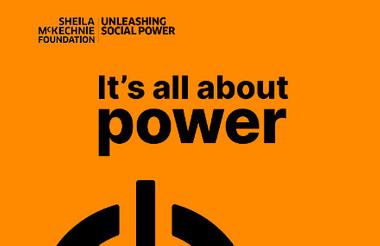A trustee who resigned last week from the Sheila McKechnie Foundation has criticised the charity’s project on lived experience and power sharing.
The Power Project was launched by SMK in 2020 to examine relations of power in the charity sector, particularly in engaging people with lived experience of inequality.
Its research culminated in a report published last March, which tells charities to think differently about power and stop “tokenistic” approaches to working with people with lived experience.
However, Bushra Ahmed, who resigned as a trustee of SMK last week, has called the project “inauthentic” and accused the charity of “selling something that doesn’t belong to them”.
The charity has said it is “deeply sorry for any hurt caused” adding that although it has a different perspective on what occurred, “we recognise and respect that others will have theirs”.
Trustee resigns over concerns
Around 300 people contributed to the Power Project in some way, but a core learning group (CLG) of nine individuals helped to guide the research.
The CLG included Ahmed who resigned last week due to the charity’s response to a Charity Times article that voiced allegations of “power hoarding” during the project.
Ahmed said she was not consulted on SMK’s statement given to the publication despite being a member of the CLG and a trustee. SMK said this was because she had been recused from the process.
Speaking to Civil Society, Ahmed said: “That Charity Times article prompted SMK to release a statement that was really upsetting. So, although I had been planning to resign at some point, that kind of pushed me to resign there and then.”
She also said she felt she had been “frozen off the board” for raising concerns which she felt had been dealt with like “hostile challenges”.
Sue Tibballs, chief executive of SMK, told Civil Society that Ahmed had not been involved in the board response because she had been recused from the process that was initiated after she had raised concerns.
In a statement posted on LinkedIn announcing her resignation, Ahmed said: “SMK are firmly holding onto all of the power, with no intention of sharing it. We see classist and racist attitudes about people with lived experience. They are willing to use our knowledge, but they are not willing to do the work of collaboration.”
‘I became the problem’
Ahmed felt that by raising some of the CLG’s concerns with the board, this was received as a “grievance” and a “hostile challenge” which trustees may not have expected from her, someone with lived experience who came onto the board from the Power Project.
“I've got to challenge when I see something is wrong. This was definitely wrong. It was a risk to reputation. I had to step up, but by stepping up I became the problem. And that's what's been very clear to me – that they did not like that. They saw it as hostile.”
Ahmed called the Power Project “inauthentic”.
She said: “The inauthentic bit of this is how can you have a project on power and sell it in the sector and lecture people and we are the ones who can come and tell you how to do it.
“And yet when you face challenges in your own organisation to look at the people who actually built that project for you, and then you’ve walked off with it as if it’s your own. They’re selling something that doesn’t belong to them.”
Skills audit for people with lived experience
Ahmed told Civil Society she and other CLG members felt “blocked” by SMK from progressing from their work on the CLG to becoming associates, roles in which people deliver training and consultancy on behalf of SMK.
Documents seen by Civil Society show a first draft of an SMK skills framework to help determine whether someone with lived experience could become an associate.
It included headings on whether those with lived experience had qualities like “speaking (and listening)” and “writing”.
In an email from Tibballs, seen by Civil Society, she stated that SMK did not intend for the framework to come across as a “checklist” and recognised that it “does not allow for development”.
Tibballs told Civil Society the charity had discussed creating a new role of advocate, that would allow people to have more freedom to speak about lived experience and be paid at the same rate as an associate.
‘Co-design’ or informally guide?
Documents seen by Civil Society show that the CLG were told they would be “co-designing” the Power Project when it began in 2020.
In emails to staff, also seen by Civil Society, an SMK statement agreed the charity had made mistakes during the project process.
A statement to staff, in response to concerns raised by the board, reads: “We understand that there is a lack of clarity about who ‘authored’ our guide, It’s All About Power, or who it ‘belongs to’. We fully understand why this might be unclear and take responsibility for using terms like ‘co-design’ early in the project that would suggest the entire project and the resultant guide were a collective effort,” it reads.
The statement says that SMK worked hard to ensure CLG’s members felt their contribution was “properly acknowledged” with a preface at the front of the guide stating the group’s importance.
“We stand by this statement, but we do not think the work is ‘owned’ equally by SMK and CLG members and are concerned that this lens is misleading,” it reads.
“Authorship of the guide, and accountability for the project, rest with SMK. The team fully recognise we should have been clearer about this – both with ourselves and others – and apologise for its consequence.”
SMK: ‘We are deeply sorry for any hurt caused’
A spokesperson from SMK told Civil Society: “Last year, Bushra was one of two people involved in the Power Project who raised concerns with SMK's board about our approach to working with those with first-hand (or ‘lived’) experience. In response, the board set up a process to investigate their concerns which involved other members of the Core Learning Group as well as SMK staff. As a trustee, Bushra was recused from the board's role in the process.
“The board shared their response, with clear proposals, last autumn to the satisfaction of other members of the CLG but has yet to receive a response from either of the people who first raised concerns. We regret that neither felt able to engage fully with the board or respond to our suggestions, which has made meaningful conversations all but impossible. After nine months, the board closed their process since which time both people are now publishing existing and fresh concerns in blogs and on social media. SMK has responded with a public statement. Bushra was not consulted on the statement as she was recused from the process to consider the concerns she raised.
“We are deeply sorry for any hurt caused to either person – and to our staff, our award nominees and our partners – by this experience. The issues are sensitive, complex and often contested – there are not always definitive answers. Although we have a different perspective on what occurred, we recognise and respect that others will have theirs. As we have already stated, our learning is continuous and we are committed to sharing it, including in a Learning Report to be published soon.”
Related articles











